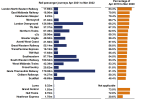Some interesting figures quoted here given there's been discussion and speculation on various other threads:

Bear in mind these figures are for the full financial year and are currently trending a good bit higher. As I've commented before even figures over 50% are better than at the end of the nineties, so any suggestions of widespread closures should be very far from the mark in any sensible world.

Rail travel recovering from the pandemic, but season ticket sales still weak
Rail travel continues to recover from the pandemic, but season ticket sales are still far below their pre-pandemic levels, according to figures from the Office of Rail and Road (ORR).
www.ianvisits.co.uk
For the last full financial year passenger numbers were at 57% and revenue has pretty much tracked it at 54%. Even given there's been a fares rise this undermines the suggestion from many people here that revenue would be much lower due to more people travelling for leisure and fewer people buying seasons.Rail travel continues to recover from the pandemic, but season ticket sales are still far below their pre-pandemic levels, according to figures from the Office of Rail and Road (ORR).
Just under a billion rail journeys were made between April 2021 and March 2022, compared to just 388 million in the previous year, at the height of the lockdown. However, it’s still just 57% of the number of journeys made on the railways before the pandemic....
Bear in mind these figures are for the full financial year and are currently trending a good bit higher. As I've commented before even figures over 50% are better than at the end of the nineties, so any suggestions of widespread closures should be very far from the mark in any sensible world.


